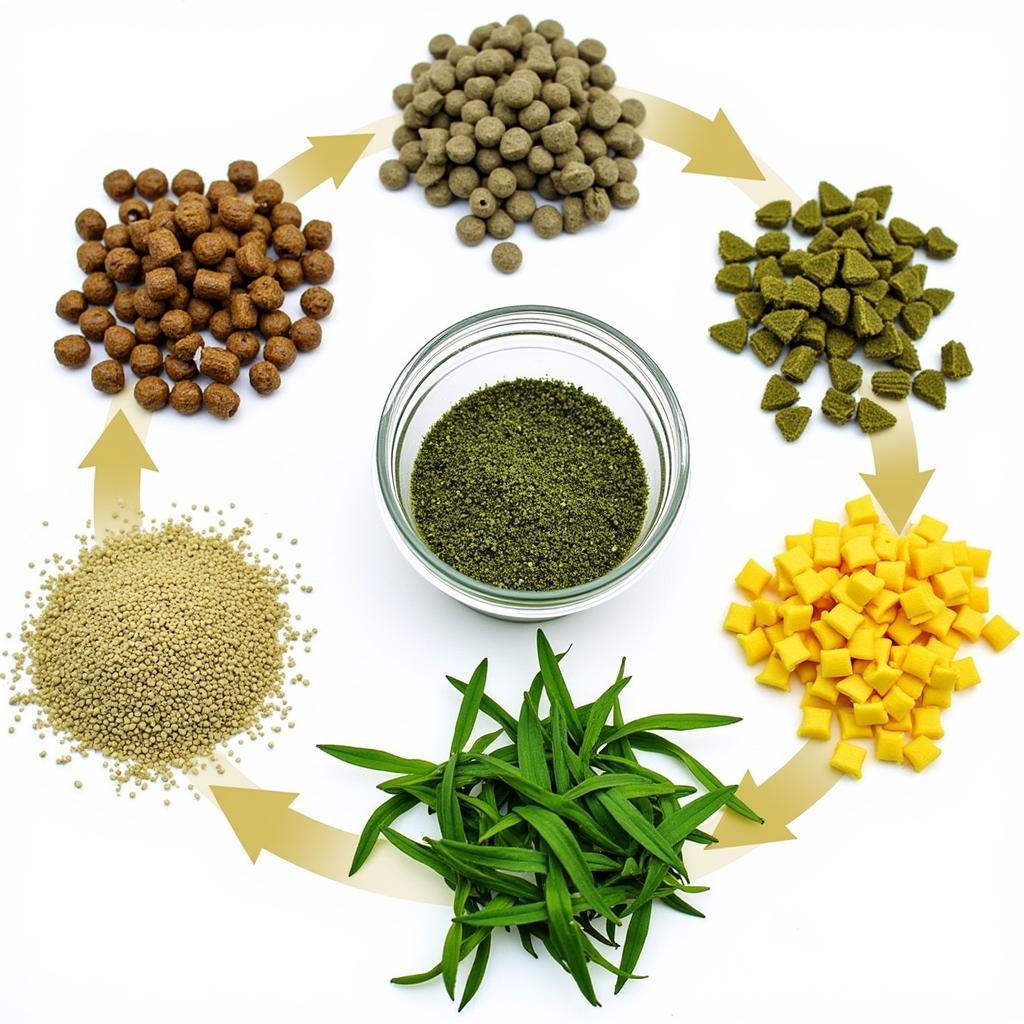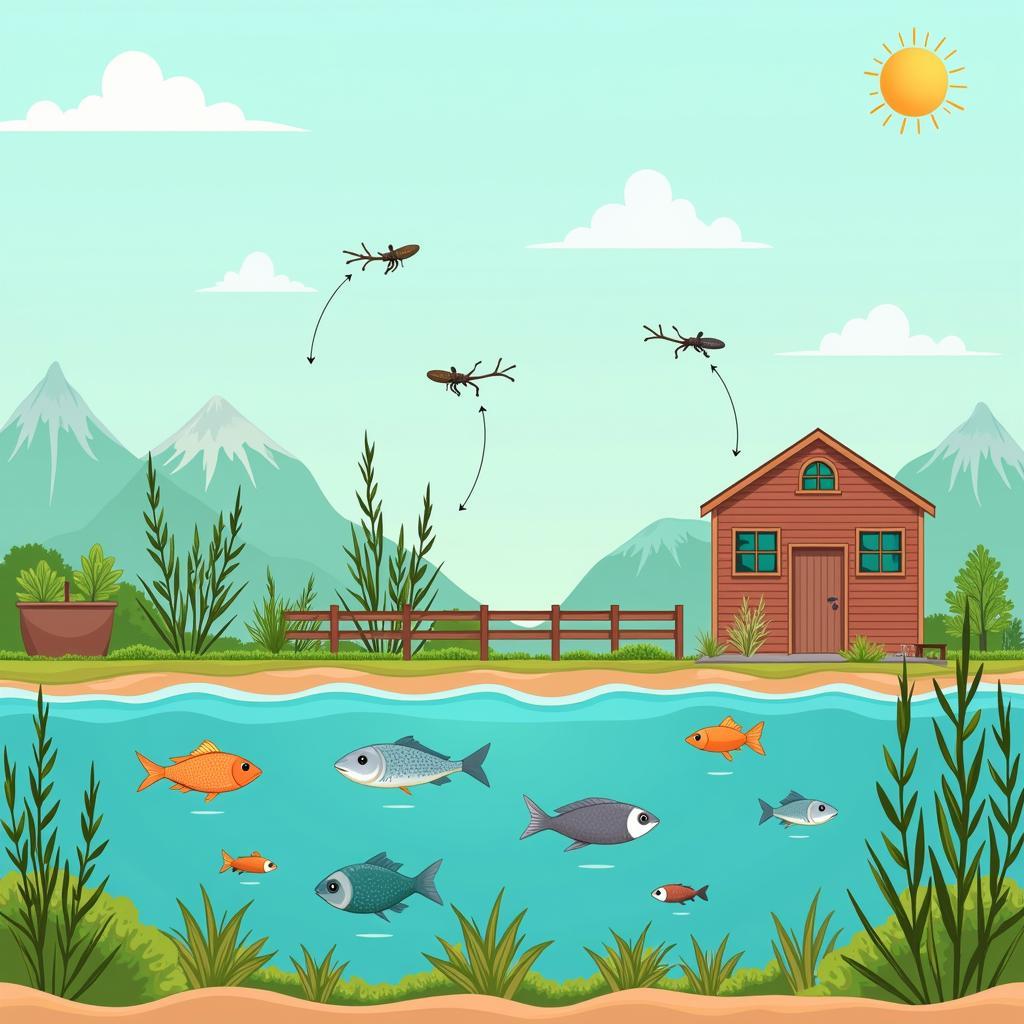Fish Food Substitutes are becoming increasingly popular as pet owners seek alternative and sustainable ways to feed their aquatic companions. Whether driven by concerns about overfishing, a desire for more ethical pet food, or simply exploring variety in their fish’s diet, many are turning to innovative solutions. Let’s dive deep into the world of fish food alternatives and discover what options are available for your finned friends. You may even find some inspiration in our list of Bright Future Foods.
What are Fish Food Substitutes?
Fish food substitutes are alternative food sources that can replace or supplement traditional commercial fish food. They offer diverse nutritional profiles and can cater to different dietary needs and preferences of various fish species. These alternatives range from insect-based protein sources to algae and even lab-grown meat.
After exploring the topic of fish food substitutes, you might be interested in learning about a Vegetarian Fish Food option.
Why Consider Fish Food Substitutes?
Many factors motivate pet owners to seek fish food substitutes. Overfishing is a significant concern, impacting wild fish populations and marine ecosystems. Using alternative food sources can help alleviate this pressure. Additionally, some commercial fish foods contain unsustainable ingredients or byproducts. Substitutes can offer a more ethical and environmentally friendly approach. Finally, some fish may have specific dietary needs due to allergies or health conditions, and substitutes can provide tailored nutrition.
Types of Fish Food Substitutes
Several fish food substitutes are gaining traction in the market. Insect-based fish foods, like those featuring black soldier fly larvae, are a sustainable and protein-rich option. Algae, a natural part of many fish diets, can be cultivated sustainably and offers a great source of essential nutrients. Lab-grown meat, though still in its early stages, holds immense potential as a sustainable and cruelty-free alternative. Other options include duckweed, various vegetables, and even certain types of worms. Choosing the right substitute depends on the specific species of fish and its dietary requirements.
 Various Fish Food Substitute Options
Various Fish Food Substitute Options
Considering a change in your pet’s diet? Check out our selection of 6 Fish Cat Food for more ideas.
Choosing the Right Substitute: Factors to Consider
When selecting a fish food substitute, consider your fish’s species, age, and dietary needs. Carnivorous fish require higher protein content, while herbivores thrive on plant-based diets. The nutritional profile of the substitute should align with these needs. Also, consider the palatability of the food. Some fish can be picky eaters, so transitioning slowly and observing their response is crucial. Finally, factor in the sustainability and ethical sourcing of the substitute.
 Sustainable Fish Food Production
Sustainable Fish Food Production
You can explore more about healthy eating habits with our 28 Day Sugar Detox Food List Pdf.
Transitioning to a New Food
Introduce the new food gradually to avoid digestive upset. Start by mixing a small amount of the substitute with the existing food and gradually increase the proportion over several weeks. Observe your fish for any signs of stress or digestive issues. If they refuse the new food, try a different substitute or consult a veterinarian specializing in aquatic animals.
Conclusion: A Brighter Future for Fish Food
Fish food substitutes offer a promising path towards a more sustainable and ethical future for feeding our aquatic companions. By understanding the various options and choosing the right substitute for your fish, you can contribute to a healthier planet and provide your fish with a nutritious and enriching diet. Considering the environmental impact of food choices is crucial, not just for our pets but for ourselves as well. Learn more about sustainable food options on our page dedicated to Bright Future Foods.
Looking for a low-carb option for yourself? Check out our Dirty Lazy Keto Food List.
FAQ
- Are fish food substitutes more expensive than traditional fish food? The cost varies depending on the type of substitute.
- Can I feed my fish only substitutes, or should I combine them with commercial food? It depends on the specific substitute and your fish’s needs.
- Where can I buy fish food substitutes? Specialty pet stores, online retailers, and even some local fish farms.
- Are all fish food substitutes sustainable? Not all are created equal; research the source and production methods.
- How do I know if a substitute is right for my fish? Research your fish’s species and dietary requirements.
- What are the signs that my fish is not tolerating a new food? Loss of appetite, lethargy, changes in stool, or unusual swimming behavior.
- Can I make my own fish food substitutes? Yes, but it requires careful research to ensure nutritional balance.
Need help with your fish’s diet? Contact us! Phone: 02437655121, Email: [email protected] or visit us at 3PGH+8R9, ĐT70A, thôn Trung, Bắc Từ Liêm, Hà Nội, Việt Nam. We have a 24/7 customer support team.